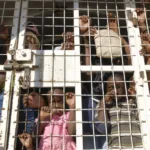President-elect Donald Trump seems more committed than ever to implementing his Project 2025, a plan he had previously denied during his campaign. One of the first areas targeted, as expected, is immigration.
Trump’s incoming administration plans to cancel a policy that, for over a decade, has prevented Immigration and Customs Enforcement (ICE) agents from making arrests in certain sensitive locations, such as churches, hospitals, and family gatherings, unless approved by higher-ups.
This policy was established in 2011 by then-ICE Director John Morton, designed to allow undocumented immigrants to access vital services without fearing arrest during routine activities like medical visits or attending schools.
Under the new plan, Donald Trump intends to eliminate these restrictions on his first day in office, accelerating his aggressive immigration enforcement strategy, particularly in relation to the deportation of migrants.
Sources familiar with the policy change informed NBC News that the new approach would allow ICE agents to make arrests in a broader range of public and private places, such as funerals, weddings, demonstrations, and even during visits to religious institutions, without needing prior authorization.
This measure is part of Trump’s broader immigration agenda, which includes increased crackdowns on undocumented immigrants and expanding deportation efforts across the United States.
This policy shift marks a significant break from the stance taken during Trump’s first term and the Biden administration, where restrictions were in place to avoid unnecessary disruptions in public and community spaces.
The decision to overturn this policy has raised concerns, particularly among civil rights groups, religious organizations, and communities that have traditionally supported immigrants.
Lee Gelernt, an attorney at the American Civil Liberties Union (ACLU), emphasized that while ICE agents can legally make arrests in such locations, it does not necessarily constitute a sound or ethical public policy. He highlighted that one major concern is the fear this measure could instill in undocumented immigrants, discouraging them from seeking medical care or sending their children to school. Gelernt added that the purpose of past policies was to strike a balance between law enforcement and protecting the safety and well-being of immigrant communities.
The policy banning arrests in sensitive locations had already allowed ICE agents to conduct operations under specific circumstances, such as national security concerns, terrorist threats, or when pursuing criminal fugitives. In fact, under Trump’s first term, 63 planned arrests and five emergency arrests occurred in these sensitive locations. According to a former Department of Homeland Security (DHS) official, the initial reason for the policy may have been justified, but it was “abused” by individuals seeking refuge in places like churches to avoid deportation.
Some members of Trump’s circle argue that the policy limiting ICE actions in sensitive locations is no longer necessary and could be used to better enforce immigration laws.
However, this position faces strong resistance from immigrant advocates and religious leaders, many of whom are concerned about the potential backlash. A deacon from an Arizona church that has previously provided sanctuary to migrants expressed concerns that this policy change could result in negative reactions toward religious communities supporting vulnerable immigrants.
This policy shift is part of Trump’s broader strategy for his second term, known as “Project 2025,” which includes drastic measures against illegal immigration. Some experts fear that this measure could further strain community relations and create greater hardships for immigrants, particularly those in the most vulnerable positions, as they could now be detained during activities essential to their daily lives.
This proposed change to ICE’s policy has sparked intense debate and criticism from legal experts and religious leaders, who argue that the consequences of this decision could harm immigrant communities and raise ethical questions about enforcing immigration laws in sensitive contexts. Loosening the restrictions on ICE arrests is one of the central components of Trump’s broader immigration agenda and reflects his ongoing commitment to stricter policies aimed at reducing the number of undocumented immigrants living in the United States.
For more information on this policy change and its implications, visit NBC News.






